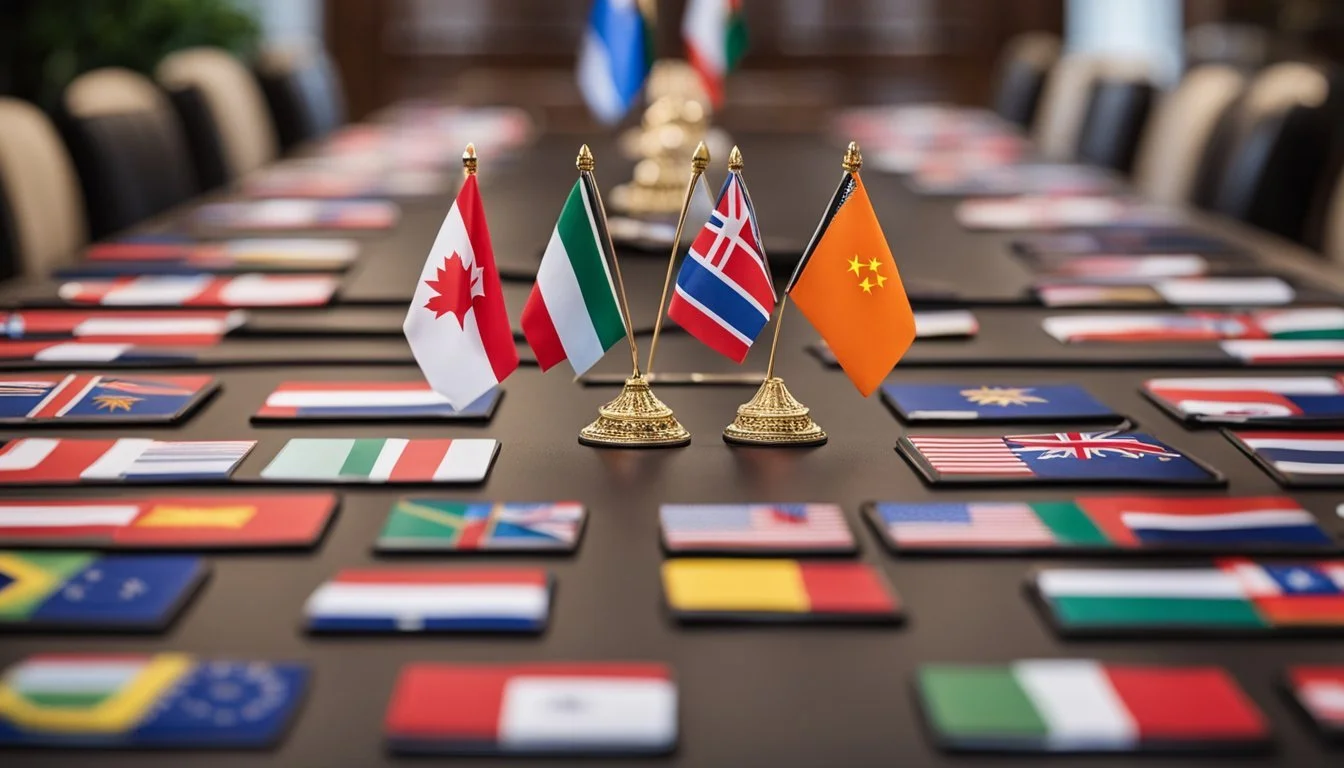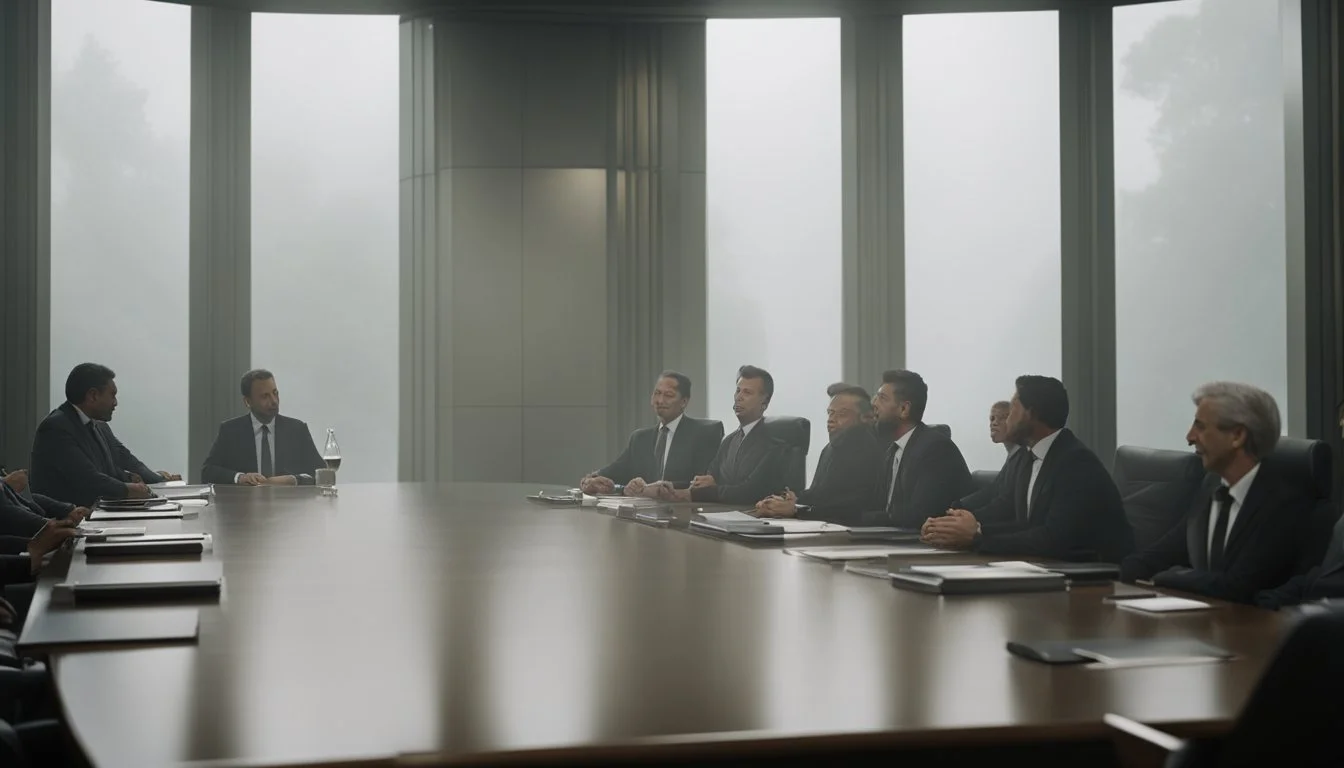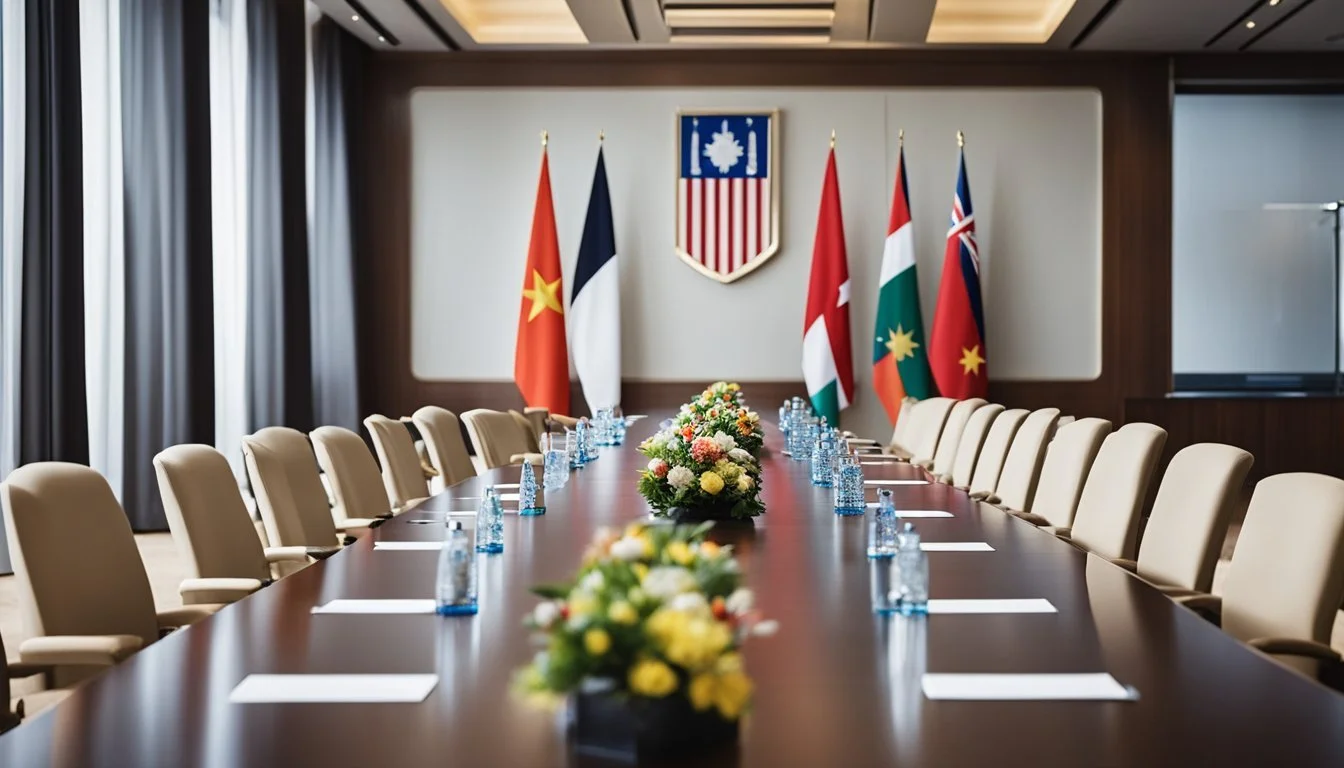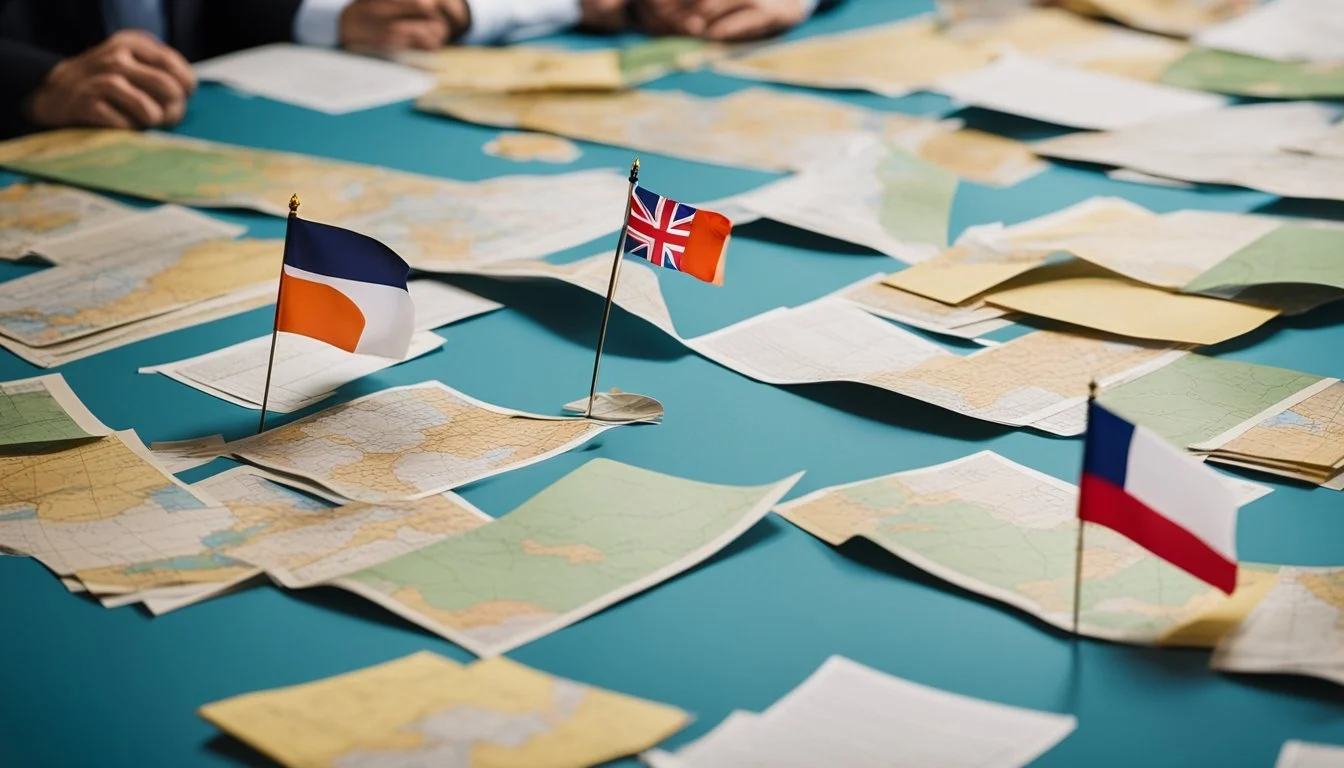10 Riveting Documentaries on International Diplomacy
Must-Watch Films for Global Affairs Enthusiasts
Exploring the intricate world of international diplomacy through documentaries provides a unique lens on the interplay of global politics, conflict resolution, and statecraft. These films offer an in-depth look at crucial moments in history and the pivotal figures who have shaped diplomatic efforts across various regions and eras.
For those interested in the nuances of global affairs, documentaries on international diplomacy present a compelling way to gain insights into how nations negotiate peace, manage conflicts, and navigate the complexities of international relations. Through these visual narratives, viewers can better appreciate the delicate balance of power and the often unseen efforts of diplomats working behind the scenes.
1) The Fog of War (2003)
"The Fog of War" is a documentary directed by Errol Morris that features an in-depth interview with Robert S. McNamara. McNamara served as the United States Secretary of Defense during the Kennedy and Johnson administrations.
The film explores key events from the 20th century, including World War II, the Cuban Missile Crisis, and the Vietnam War. McNamara provides personal insights and reflections on these significant historical events.
Morris' documentary not only sheds light on McNamara's career but also delves into the concept of the "fog of war," the uncertainty in warfare. The film is notable for its original score by Philip Glass, which enhances the storytelling.
This film is a must-watch for anyone interested in international diplomacy and military history. More information.
2) The Diplomat (2023)
"The Diplomat" is a TV series that plunges into the complexities of international diplomacy. Created by Debora Cahn, the series stars Keri Russell as Kate Wyler, a career diplomat thrust into a high-stakes position amid an international crisis.
The series does an excellent job of portraying the political maneuvering and personal sacrifices inherent in diplomatic work.
Kate's assignment in the series brings to light the intricate balance diplomats must maintain between their professional duties and personal lives. The plot explores the impact of her high-profile role on her marriage and political future.
The series stands out for its attention to detail and realistic portrayal of diplomatic challenges, making it a must-watch for those interested in global politics.
It brings an engaging perspective on the roles and responsibilities of diplomats in times of international tension. The series is available on Netflix. For more information, you can visit IMDB's page on "The Diplomat".
3) Inside Job (2010)
"Inside Job" examines the global financial crisis of 2008 and its wide-reaching implications. Directed by Charles Ferguson and narrated by Matt Damon, the documentary provides a comprehensive investigation into the causes of the meltdown.
The film delves into the corrupt practices within the finance industry. It reveals how deregulation and conflicts of interest contributed to the crisis.
Intense interviews with key financial insiders, politicians, and academics highlight the systemic failures. The documentary effectively breaks down complex financial concepts, making them accessible to viewers.
The economic meltdown cost over $20 trillion. Millions of people worldwide lost their homes and jobs due to the crisis.
"Inside Job" is notable for its rigorous research and compelling storytelling. It received critical acclaim and several awards, including the Academy Award for Best Documentary Feature.
For more information, visit the Inside Job Wikipedia page.
4) Restrepo (2010)
"Restrepo" is a gripping documentary set during the Afghanistan War. Directed by Tim Hetherington and Sebastian Junger, it focuses on a US Army platoon's 15-month deployment in the Korengal Valley, one of the war's most dangerous regions.
The film is named after a remote outpost called Restrepo, in honor of a fallen platoon medic. The documentary captures the intense and often volatile daily experiences of soldiers stationed there.
It offers an unfiltered look at the challenges of modern warfare, from engaging with enemy combatants to coping with the mental and emotional strain. The directors spent a year with the platoon, documenting their lives in combat and moments of camaraderie.
Interspersed with interviews, it provides personal insights from the soldiers themselves, adding depth to their on-ground experiences. "Restrepo" stands out for its raw and heartfelt portrayal of life during war.
For more details, visit the Wikipedia page.
5) Our Man in Tehran (2018)
"Our Man in Tehran" is a riveting documentary that delves into the intricate details of international diplomacy during the Iran Hostage Crisis. This film shines a spotlight on the efforts to rescue six American diplomats who had taken refuge in the Canadian embassy in Tehran.
The film is based on the book by Robert Wright, which recounts the true events behind the secret mission. The crisis began in November 1979 when Iranian students stormed the American embassy, capturing more than fifty American personnel. These events underscore the tense geopolitical landscape of the time.
Directed by Larry Weinstein and Drew Taylor, the documentary provides in-depth interviews and archival footage, offering viewers a comprehensive understanding of the complex rescue operation. Key players, including Canadian Ambassador Ken Taylor, are prominently featured to illustrate the high-risk stakes involved.
The documentary not only recounts the historical facts but also provides personal insights from those directly involved. "Our Man in Tehran" is celebrated for its gripping narrative and meticulous attention to detail, making it a must-watch for anyone interested in history and international relations.
Additional information about "Our Man in Tehran" can be found on IMDB.
6) Dirty Wars (2013)
"Dirty Wars," directed by Richard Rowley, is a documentary that takes an in-depth look at America's covert military operations. The film follows investigative journalist Jeremy Scahill, who uncovers the global reach and impact of these secret missions.
Scahill's journey leads to startling revelations about the Joint Special Operations Command (JSOC) and its "kill list," which includes both foreign nationals and U.S. citizens. The documentary showcases the human toll of these clandestine operations and highlights their legal and ethical ramifications.
With a runtime of 86 minutes, "Dirty Wars" earned a nomination for Best Documentary Feature at the Academy Awards. The film is notable not only for its investigative journalism but also for its intense narrative style, which has been compared to a 1970s conspiracy thriller.
To learn more about "Dirty Wars," visit IMDb.
7) The Gatekeepers (2012)
"The Gatekeepers" is a compelling documentary directed by Dror Moreh. The film offers an unprecedented look into the workings of Israel's internal security service, Shin Bet. It features interviews with six former heads of the agency, sharing their insights and reflections on their decisions.
Utilizing archival footage and computer animation, the documentary provides a chronological history of Shin Bet's operations since the Six Day War in 1967. Each of the six interviewees offers a unique perspective, contributing to a multifaceted portrayal of the agency.
The film explores critical events in Israeli history and the moral and strategic dilemmas faced by the Shin Bet leaders. It presents a rare, candid view into the complex world of national security and internal conflict management.
For further information, visit the Wikipedia page on The Gatekeepers.
8) The Unknown Known (2013)
"The Unknown Known" is a documentary directed by Errol Morris. It focuses on Donald Rumsfeld, who served as the U.S. Secretary of Defense. The film delves into his long political career, particularly emphasizing his role during the George W. Bush administration.
Through a series of interviews, Rumsfeld discusses his memos, also known as "snowflakes." These memos provide a fascinating insight into his thoughts and policies. The film also revisits key moments in modern history, including the Iraq War and the events leading up to it.
"The Unknown Known" offers viewers a chance to see Rumsfeld's perspectives and justifications for his actions. The title itself is a play on Rumsfeld's famous statement about known knowns, known unknowns, and unknown unknowns.
The documentary combines archival footage and contemporary interviews. It is an exploration of power, decision-making, and the complexities involved in global diplomacy. It doesn't sensationalize; instead, it presents Rumsfeld's views as he sees them.
For more information, visit IMDB.
9) Oslo Diaries (2018)
"Oslo Diaries" provides an intimate look at the clandestine peace talks between Israelis and Palestinians that took place in Oslo during the 1990s. The documentary is directed by Mor Loushy and Daniel Sivan.
The film features exclusive interviews with key participants, including the last on-camera conversation with former Israeli president Shimon Peres. It reveals the complexities and emotions of the 1100 days of secret negotiations.
Using never-before-seen footage, "Oslo Diaries" recounts the political intrigue, fiery debates, and the unlikely bonds formed during these intense discussions. Personal diary entries from the negotiators add depth to the narrative.
This documentary stands out for its blend of geopolitical analysis and personal storytelling, offering insights into the human side of international diplomacy. Learn more about Oslo Diaries.
10) The China Hustle (2017)
"The China Hustle" is a finance documentary directed by Jed Rothstein. The film reveals shocking securities fraud by Chinese companies listed on the U.S. stock market.
Activist shareholders like Dan David and Jon Carnes play significant roles in exposing these frauds. The documentary highlights the loopholes that allowed these frauds to proliferate.
Produced by Magnolia Pictures, the film brings to light investor greed and regulatory failures. It serves as a wake-up call about the vulnerabilities in the global financial system.
For more information, visit IMDb.
The Role of Diplomacy in Global Politics
Diplomacy is integral to maintaining international relations, resolving conflicts, and promoting global cooperation. Its importance has evolved and adapted over centuries, showcasing both historical significance and modern strategies.
Historical Significance of Diplomacy
Diplomacy has long been a cornerstone of international relations. Historically, it was used to form alliances, negotiate peace treaties, and facilitate trade agreements.
The Congress of Vienna (1814-1815) serves as a classic example when European powers met to restore order after the Napoleonic Wars. This event marked a significant diplomatic success, leading to nearly a century of relative peace in Europe.
Treaties, such as the Treaty of Westphalia (1648), which ended the Thirty Years' War, highlight diplomacy's role in shaping the modern state system and sovereignty principles.
Key figures like Otto von Bismarck are celebrated for their diplomatic prowess, unifying Germany through strategic alliances and carefully negotiated treaties.
Modern Diplomatic Strategies
In contemporary global politics, diplomacy involves more than just state-to-state interactions. It includes multilateral engagements within international organizations like the United Nations and the European Union.
Modern diplomacy often addresses complex issues such as climate change, terrorism, and human rights. Shuttle diplomacy, where diplomats travel between conflicting parties to negotiate, has proven effective in conflict resolution.
Additionally, digital diplomacy or "e-diplomacy" uses internet and social media to engage with global audiences and influence public opinion.
Prominent examples include the Iran Nuclear Deal (2015), showcasing the collaborative efforts of multiple countries and diplomatic negotiation techniques to curb nuclear proliferation.
Effective modern diplomacy requires a mix of soft power, economic incentives, and strategic dialogue to address and resolve international issues.
Key Figures in Diplomacy
Prominent diplomats have shaped international relations and contributed significantly to global peace efforts. Their decisions and negotiations often paved the way for critical treaties and resolutions.
Influential Diplomats
One key figure in diplomacy is Robert S. McNamara. As the U.S. Secretary of Defense during the Kennedy and Johnson administrations, his role in the Cuban Missile Crisis and the Vietnam War was pivotal. His insight into balancing military strategy with diplomatic efforts was critical during tense periods of the 20th century.
Another notable diplomat is Henry Kissinger. Serving as U.S. Secretary of State, his work on détente with the Soviet Union and opening relations with China had a lasting effect on international diplomacy. His negotiations during the Vietnam War led to a ceasefire and eventual withdrawal of U.S. troops.
Contributions to International Peace
The efforts of diplomats like Kofi Annan have been instrumental in peacekeeping. As the Secretary-General of the United Nations, Annan reformed UN peacekeeping operations and actively worked on resolving conflicts in Africa and the Middle East. His mediation in the Israeli-Lebanese war and initiatives in Darfur were crucial in reducing hostilities.
Dag Hammarskjöld, another Secretary-General of the United Nations, made significant contributions to peace efforts during the Cold War era. He played a key role in de-escalating the Suez Crisis and established UN peacekeeping forces which became essential tools for maintaining global peace. His legacy is remembered for reinforcing the role of the UN in international diplomacy.








